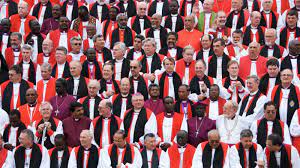 St Alban’s Episcopal Church Bolivar, Missouri Tuesday, August 2, 2022 Lambeth Conference – What is it?  The Lambeth Conference Every ten years, for the last 150 years, Anglican bishops from across the globe come together for a couple of weeks of study, fellowship, prayer, worship – and a whole lot of talk together. It’s important. We are NOT one church around the world, but a communion of churches whose roots are in the Anglican tradition. We are one communion, but not one church. Each is independent in policy, and yet each also follows similar patterns of worship. Henry VIII had no idea that what he was doing when he broke away from Rome would create independent, but related national churches in so many different countries, languages and cultures. There are 650 bishops there – and organizing them to do anything looks a lot like herding cats! If you have been following the news that Bishop Diane has been posting every day, on the St Alban’s website, or on our Facebook page, you will have seen a whole lot of fascinating material and encouraging photos. The Sunday morning Eucharist was two hours long – but if you watch it, you will be moved by the readings in other languages, the music throughout from so many different cultures, in different languages and styles. For me the highlight was the sermon. It isn’t long, and you will find it on our website. (The whole service is there – but you can scroll to the sermon – the place where it begins is noted.)The bishop of Lesotho in Southern Africa was simply spectacular. Her words will stay with you for a long time. Yesterday, the many women bishops gathered – and the stories they shared seem to have been especially wonderful. For example, the bishop of the Amazon region told of her travels to the remote towns of the diocese by water – often 30 hour boat trips on rivers where dangerous River Pirates operate. The stories of so many women called, ordained and consecrated to leadership within the body of Christ are strong, encouraging and powerful. Today Bishop Deon Johnson of the Diocese of Missouri wrote about the talk by the Archbishop of Canterbury, the host of the Conference. His role NOT like the pope’s. He has absolutely no authority at all over any of the national churches within the Anglican communion. He doesn’t choose their bishops. But he does hold a position of leadership at the Conference. He sets the tone, so to speak. And today’s topic was a difficult one. As you know, bishops from Africa have mostly been slow to ordain women; in the 1970’s that nearly tore the communion apart. Now the issue is partnered homosexuals within the church; and that has caused a great deal of stress between different churches and bishops. It could have torn this gathering apart. A few probably hoped it would. The Archbishop of Canterbury Justin Welby He had the unenviable responsibility of speaking to both those mostly African bishops who oppose Christian support for same sex marriages, and to the progressive bishops who support them. He was clear that even conservative churches in the communion do not support the abuse or condemnation of gay persons within their churches or countries. They simply support abstinence. That used to be a universal opinion, even in the Episcopal Church not many years ago. I find his remarks hopeful – and helpful. Archbishop Justin Welby spoke first to the biblical underpinnings of the conservative bishops’ beliefs: “For them, to question this teaching is unthinkable, and in many countries would make the church a victim of derision, contempt and even attack. For many churches to change traditional teaching challenges their very existence.” But then he drew a direct parallel to the discernment of provinces (like the Episcopal Church) that reached a different conclusion on human sexuality. “They are not careless about scripture. They do not reject Christ. But they have come to a different view on sexuality after long prayer, deep study, and reflection on understandings of human nature. For these churches not to change traditional teaching would make them a victim of derision, contempt and even attack. For them not to change would challenge their very existence.” He acknowledged that the traditional teaching remains the majority opinion within national churches, but did not say that it is what that opinion should be. “Differences from province to province states the reality of life in the communion today.” He said. And Welby refused to allow the conservatives to try to force their perspectives on the rest of the churches by vote or otherwise. And there seemed to be little appetite for it, anyway. It does seem that actually meeting, talking with, listening to, and eating alongside people with very different experiences and who have different stories to tell, has dampened any enthusiasm for dogmatic statements. That is to be expected. It is to be fervently hoped for. Friendships are formed and deepened even when opinions or experiences seem to be in conflict, any time that Christians come together and share their hearts and their meals – as we might expect. That is how all real unity is discovered. And the Conference is not primarily about human sexuality anyway, even though it is the one issue that has garnered the most attention here and abroad. Remember: The Anglican Communion is a group of independent national Churches. No church can dictate to another how life .should be lived within its jurisdiction. And the Lambeth Conference has exactly no power to make changes in, or rules for any of the representative churches – nor has the Archbishop of Canterbury. |

Categories:
Tags:
No responses yet